During ICANEXSEL Camp, CPS Students Discover What Engineering, Studying at Illinois Might Be Like
July 31, 2017
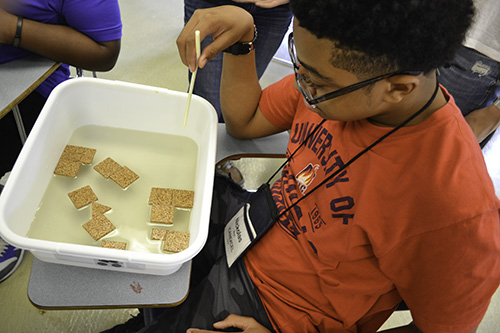
An ICANEXSEL camper learns about surface tenision and how pieces of cork bond during a Materials Science session.
Twelve soon-to-be 9th graders in Chicago Public Schools (CPS) this fall haven’t even taken one class in high school, but they’ve already found out what college life could be like—thanks to the brand new STEM camp, ICANEXSEL. The half-week, residential camp, held from July 24–26th, introduced rising CPS freshmen to several different engineering disciplines via hands-on activities and demonstrations. The camp also introduced them to some Illinois professors and students who led the activities and served as camp counsellors. Plus, the students, also got a taste of what college life (and dorm food) is like while staying at the Illinois Street Residence Halls.
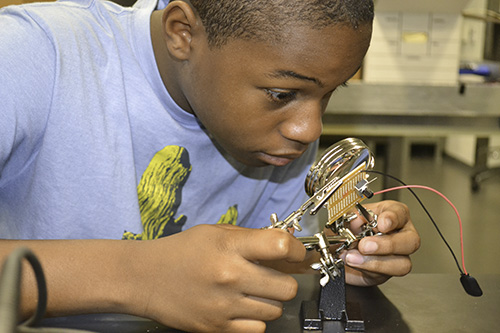
An ICANEXSEL camper solders circuits during the ECE session.
The brain-child of Engineering’s summer camp guru, Outreach Coordinator Sahid Rosado, the camp is part of ICANEXEL (Illinois-
ChiS&E Alliance for
Nurturing EXcellence in
STEM Education
Leadership), which for the last couple of years has been giving Illinois students opportunities to do STEM outreach with CPS students. However, while the academic year program involved Illinois students traveling to Chicago to do outreach, the summer camp brought the CPS students down to campus to get an idea of what college would be like.
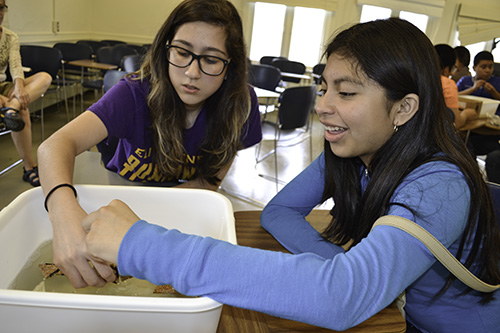
ICANEXSEL campers watch as pieces of cork towhich they've affixed magnets group themselves in patterns during Chen's acitivity on air-surface interface of materials.
The camp exposed the students to several engineering disciplines. From MatSE (Material Science and Engineering), Professor Qian Chen and her team of students introduced the high schoolers to surface tension on water, ""demonstrating self-organization of building blocks under disturbance of the air-liquid interface," according to Chen. A team of Aerospace students from Professor Phil Ansell's lab taught students about aerodynamics, following which the high school students built, then launched rockets. In addition, members of Physics Van exposed the students to some fun demos, including liquid nitrogen blowing the lid off of a plastic trash can, and a bubble volcano. The participants also learned about soldering and built their own circuit, taught by ECE's Lynford Goddard, and a team of students.
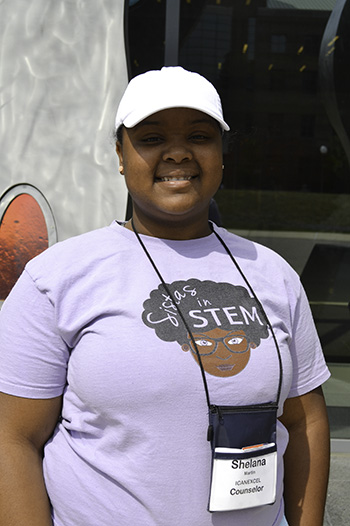
ICANEXSEL counselor Shelana Martin.
In addition, two Illinois students in STEM fields served as counselors. Both are passionate about STEM outreach and reaching the underserved in STEM.
For instance, Shelana Martin, a rising senior with a double major in astronomy and educational learning studies is Rosado’s “girl Friday” and has helped with numerous GAMES, IAI, and WYSE camps. She feels the camp will help to increase the number of underrepresented students in STEM fields.
“The benefit of bringing these kids down,” she explains, “is because most of them are definitely from communities and areas that are underrepresented in STEM fields, so getting them exposed to science now and getting them in connection with the university, it's just helping broaden that interest of STEM throughout specifically Chicago and schools that are in that area.”
The other camp counselor, Will Helgren, is a rising junior in Physics at Illinois. He’s been involved with ICANEXSEL since his freshman year, when he got started doing outreach in Chicago for four Saturdays out of the semester.
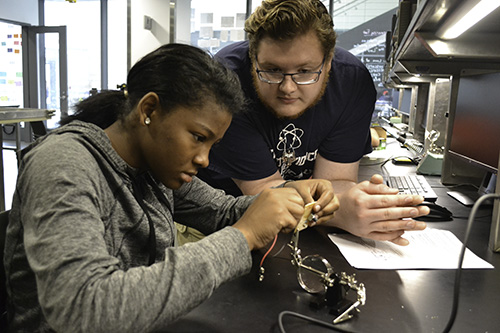
An ICANEXSEL camper solders her circuit while Illinois Physics undergrad Will Helgren offers her encouragement.
“We would take the bus up to Chicago and get to work with a bunch of kids in junior high level, teaching them basic math, science, and engineering,” he explains. In his sophomore year, Rosado enlisted him to be the onsite manager for the program, so it was only natural that he would participate as a counselor for the camp.
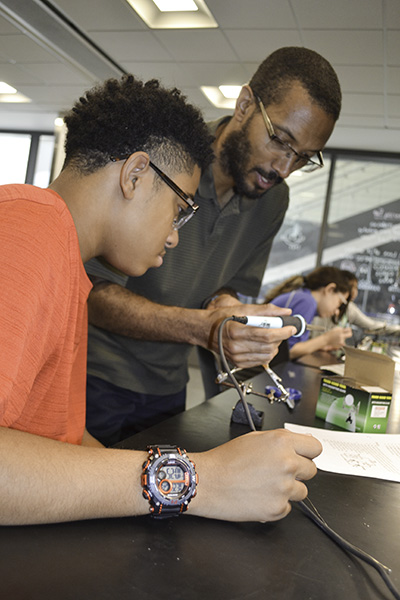
ECE's Lynford Goddard shows a camper how to solder during the ECE session on circuits.
Helgren stresses that the camp is helping to provide equity when it comes to STEM experiences. He calls the camp and its mission, “Imperative...because certain people have different opportunities based on where they live. People excel when they have the opportunities given to them, regardless of what level they're at. ”
He continues, stressing not only the STEM opportunities, but the importance of the camp being residential:
"Something like this, taking kids from places where they don't necessarily have all those opportunities all the time, and having them have the experience at such a young age of exposure to different types of engineering, and science, and opportunities on a college campus, and being able to experience living on a college campus for a few days, I think it's really important to expose them to something they may never have even have thought of, let alone been able to see for themselves.”
Rosado agrees that bringing students to campus is important; in fact, this was her primary objective in creating the camp:
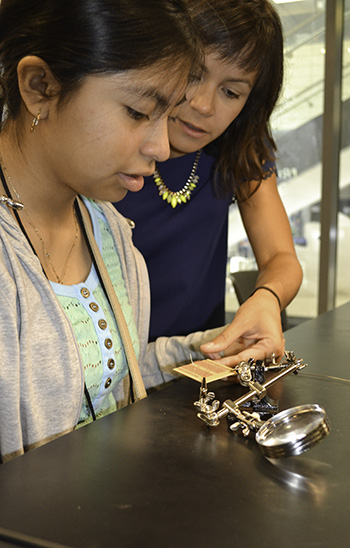
Rosado interacts with an ICANEXSEL camper during an ECE session on soldering circuits.
“I think it makes such a big difference when you bring them to campus, and they have the whole college experience. Some of them, their parents didn't go to college. So they have no frame of reference when it comes to, ‘What is college living like? So we've been thinking about doing this for a while now just because we acknowledge how important it is for them to have this experience.”
The idea is to expose the students to what it could be like for them a few years down the road and make it more familiar to them. She wants their mindset to be, "’Okay, this is something pretty cool, and it's something that I could do.’” She believes that when they consider going to college in the future, “they're not as scared to make that jump. So I think that's why it's so important to have these kids here on campus for a few days.”
According to Rosado, most of the twelve would be first-generation college students. She adds that their parents, who didn't have the opportunity to go to college themselves, are really pushing them to do it. However, she admits that, for first-generation students, considering college can be intimidating, “When you don't have a parent who's like, ‘Oh, college is so fun!’ When you don't have that person to tell you those things.”
Rosado envisions this camp as a kind of watershed experience that many of the students will look back to, once they begin to consider their plans for the future.
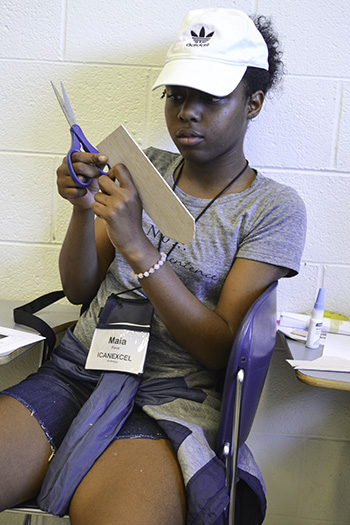
Maia Penn creates a rocket during the Aerospace session of ICANEXSEL camp..
“I think it kind of makes them see themselves in it. So when it comes time to think if they're going to college or if they're going to do something else, they can refer back to this experience and say, ‘Oh, I did it for a few days.’ Hopefully, they can refer back to this experience and say, ‘Oh, I actually really enjoyed that,’ or ‘I did it for a few days, and I was good at it,’ or ‘It wasn't as bad as I thought; it wasn't as scary as I thought.’ So hopefully they'll think about that when it comes time for them to decide what they want to do.”
The students themselves agreed that their motivation for attending the camp, besides experiencing the STEM activities, was to see what college might be like. For example, Maia Penn, a rising freshman at Deyette Performing Arts in Chicago, explains why she participated in the camp: “I liked all the activities that we do, and I wanted to experience living on campus.” What was the experience like? “It's pretty good,” she admits. “It's just the dorms.”
Regarding her passion for STEM, Penn admits “I really like math.” Her career aspirations are high; she says, “I'm thinking about being a doctor, but I'm just picking what type I want to be.”
Another student, James Davis, a rising freshman at Morgan Park High School, shares why he came to the camp:
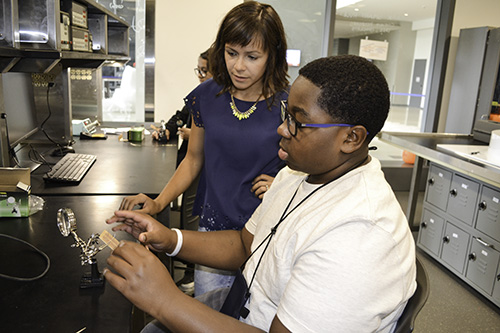
Sahid Rosado (center) watches as ICANEXSEL camper James Davis solders a circuit during the ECE session..
“Because I really like this program, and maybe engineering is not my thing, but I like the activities and stuff that we do. We're soldering now, and last year in our camp, we did soldering for breadboards.” Davis says his favorite activity was soldering, but also, “Building the rocket was cool. We used different materials.”
His first residential camp away from home, he reports: “It's fun staying in a residential camp away from home. The dorms are small. The food is good.”
Despite the small size of the dorm rooms, nothing's going to deter him: “I'm definitely going to college,” he declares.
Story and photographs by Elizabeth Innes, Communications Specialist, I-STEM Education Initiative.
For additional related I-STEM web articles, see:
- Engineering for Social Justice Scholars Program Helps Students Rethink Engineering's Role in Society
More: Engineering, Summer Camps, Underserved Minorities, 2017
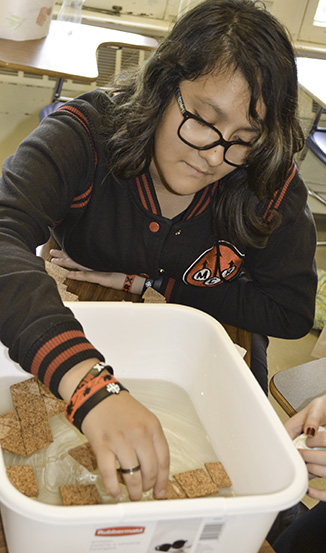
An ICANEXSEL camper watches as pieces of cork almost automatically group themselves in patterns during Chen's acitivity.
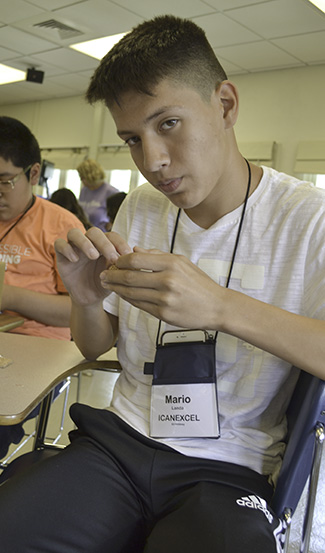
A camper places magnets on pieces of cork during Chen's acitivity on air-surface interface of materials.
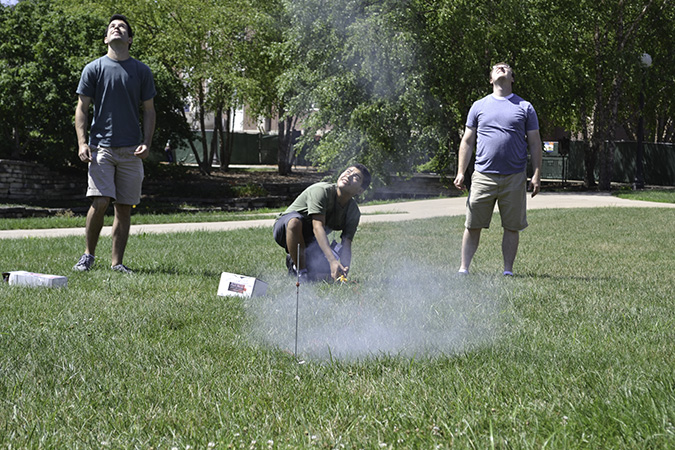
An ICANEXSEL camper watches the rocket he built, which he has just launched, soar over the Bardeen Quad.













.jpg)
















